- Clone
- A16117B (See other available formats)
- Regulatory Status
- RUO
- Other Names
- MEK1, MAP2K1, CFC3, MKK1, MAPKK1, PRKMK1
- Isotype
- Mouse IgG1, κ
- Ave. Rating
- Submit a Review
- Product Citations
- publications
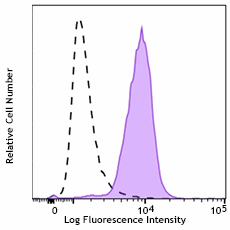
-

Human peripheral blood lymphocytes were stimulated with (filled histogram) or without (open histogram) Cell Activation Cocktail (without Brefeldin A) for 15 minutes, then fixed with Fixation Buffer, permeabilized with True-Phos™ Perm Buffer, and intracellularly stained with anti-MEK1 Phospho (Ser298) antibody (clone A16117B) APC.
| Cat # | Size | Price | Quantity Check Availability | Save | ||
|---|---|---|---|---|---|---|
| 610607 | 25 tests | £102 | ||||
| 610608 | 100 tests | £240 | ||||
MEK1 and MEK2 (Map/Erk Kinase) are serine/threonine kinases in the MAPK/ERK signaling axis that play a critical role in cellular proliferation, differentiation, and migration. Phosphorylation at MEK1 (Ser298) by PAK1 enhances the ability of upstream Raf kinases to phosphorylate regulatory serines (Ser218 and Ser222) in the activation loop, thereby stimulating kinase activity.
Product DetailsProduct Details
- Verified Reactivity
- Human, Mouse
- Antibody Type
- Monoclonal
- Host Species
- Mouse
- Immunogen
- Human MEK1 peptide phosphorylated at Ser298. Complete Freund’s adjuvant.
- Formulation
- Phosphate-buffered solution, pH 7.2, containing 0.09% sodium azide and BSA (origin USA)
- Preparation
- The antibody was purified by affinity chromatography and conjugated with APC under optimal conditions.
- Concentration
- Lot-specific (to obtain lot-specific concentration and expiration, please enter the lot number in our Certificate of Analysis online tool.)
- Storage & Handling
- The antibody solution should be stored undiluted between 2°C and 8°C, and protected from prolonged exposure to light. Do not freeze.
- Application
-
ICFC - Quality tested
- Recommended Usage
-
Each lot of this antibody is quality control tested by intracellular immunofluorescent staining with flow cytometric analysis. For flow cytometric staining, the suggested use of this reagent is 5 µL per million cells in 100 µL staining volume or 5 µL per 100 µL of whole blood. It is recommended that the reagent be titrated for optimal performance for each application.
- Excitation Laser
-
Red Laser (633 nm)
- RRID
-
AB_2888737 (BioLegend Cat. No. 610607)
AB_2888737 (BioLegend Cat. No. 610608)
Antigen Details
- Structure
- MEK1 is a 393 amino acid protein with a predicted molecular weight of 43 kD
- Distribution
-
Ubiquitously expressed/cytosolic
- Biology Area
- Cell Biology, Cell Proliferation and Viability, Signal Transduction
- Molecular Family
- Phospho-Proteins, Protein Kinases/Phosphatase
- Antigen References
-
- Song C, et al. 2017. Sci Rep. 7:46833.
- Jeong DE, et al. 2017. EMBO J. 36:1046.
- Kyriakakis E, et al. 2017. Cell Signal. 35:163.
- Narbonne P, et al. PLoS Genet. 13:e1006738.
- Wu H, et al. 2013. PLoS One. 8:e83737.
- Wang Z, et al. 2010. Oncogene. 29:3362.
- Moniz S, et al. 2007. Oncogene. 26:6071.
- Park ER, et al. 2007. Cell Signal. 7:1488.
- Gene ID
- 5604 View all products for this Gene ID
- UniProt
- View information about MEK1 Phospho Ser298 on UniProt.org
Related FAQs
Other Formats
View All MEK1 Phospho (Ser298) Reagents Request Custom Conjugation| Description | Clone | Applications |
|---|---|---|
| PE anti-MEK1 Phospho (Ser298) | A16117B | ICFC |
| Purified anti-MEK1 Phospho (Ser298) | A16117B | WB,ICFC |
| PerCP/Cyanine5.5 anti-MEK1 Phospho (Ser298) Antibody | A16117B | ICFC |
| APC anti-MEK1 Phospho (Ser298) Antibody | A16117B | ICFC |
Customers Also Purchased
Compare Data Across All Formats
This data display is provided for general comparisons between formats.
Your actual data may vary due to variations in samples, target cells, instruments and their settings, staining conditions, and other factors.
If you need assistance with selecting the best format contact our expert technical support team.
-
PE anti-MEK1 Phospho (Ser298)
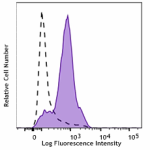
Human peripheral blood lymphocytes were stimulated with (fil... -
Purified anti-MEK1 Phospho (Ser298)
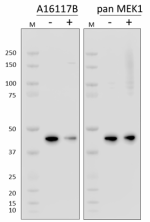
Whole cell extracts (15 µg protein) from HeLa cells untreate... 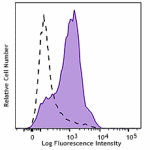
Human peripheral blood lymphocytes were stimulated with (fil... 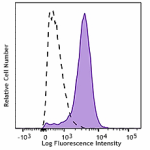
HELA cells were stimulated with (filled histogram) or withou... -
PerCP/Cyanine5.5 anti-MEK1 Phospho (Ser298) Antibody
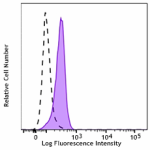
Human peripheral blood lymphocytes were stimulated with (fil... -
APC anti-MEK1 Phospho (Ser298) Antibody
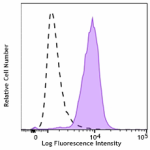
Human peripheral blood lymphocytes were stimulated with (fil...
 Login / Register
Login / Register 









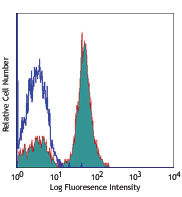
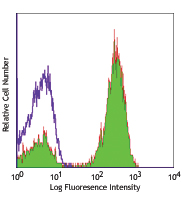





Follow Us